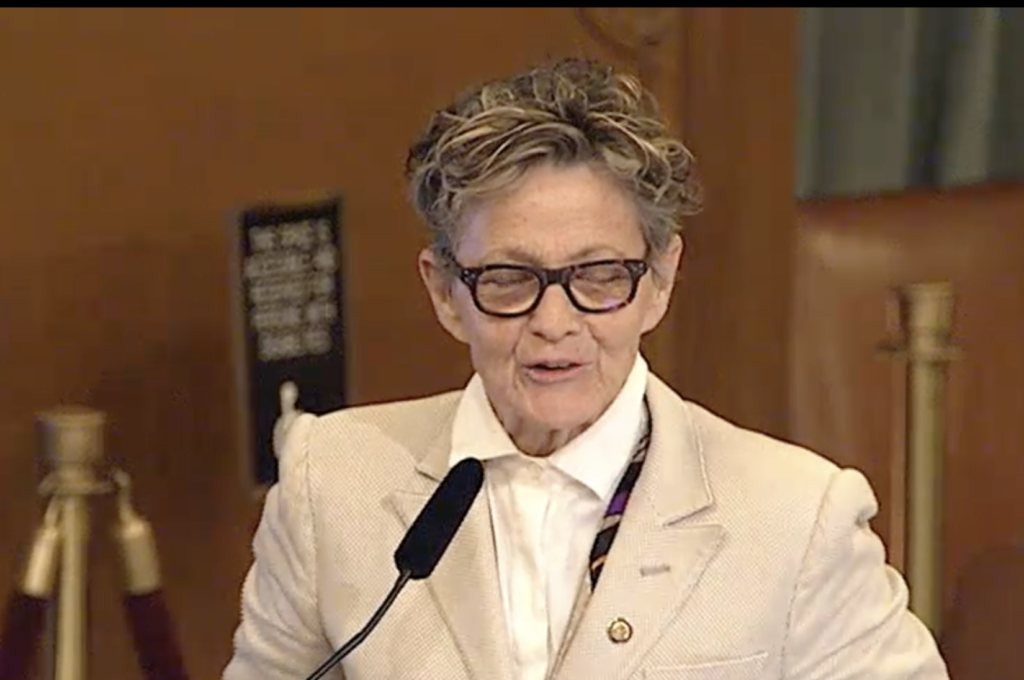>>We need your support! Become a 48hills member today so we can keep up our incredible local news + culture coverage. Just $20 a month helps sustain us. Join us here.
In a remarkable move, the Board of Supes Rules Committee this week rejected the re-nomination of Debra Walker to the Police Commission.
Walker has served for many years on various city commissions, including a 12-year stint on the Building Inspection Commission, and has been appointed by both progressives and more recently by Mayor London Breed.

But lately Walked has been a total Breed loyalist and supported the mayor’s move to undermine the authority of the commission, which has only meet twice in recent weeks as Breed’s allies have failed to show up in numbers that would create a quorum.
In the process of the hearing, Walker said that she supports allowing cops to do pretext stops and, more stunning, said she thinks commissioners “who are not cops” were too active in setting rules for the department.
That, of course, is the whole point of a police commission: Civilian oversight of law enforcement. That’s an important principle: The US Constitution makes the elected president, who is not and by law cannot by a member of the Armed Services, the commander in chief. In most cities, the police chief reports to an elected or appointed official who is not a cop, and civilian oversight agencies set policy for the sworn officers to follow.
That’s always been the role of the San Francisco Police Commission.
But Breed has been unhappy with the civilian panel since one of her appointees, Max Carter-Oberstone, started siding with progressives and demanding more accountability for the force. Lacking a working majority for her pro-cop agenda, Breed moved to undermine the authority of the commission with Prop. E. Along with new surveillance powers, the measure allows for high-speed chases without the approval of a commanding officer, and strips the commission of the authority to issue general orders without going through a long and difficult process (and in essence gives the chief veto power over new rules).
Walker supported the measure.
She also told the committee that she supports allowing officers to conduct “pretext stops” and opposed the historic policy the commission adopted in 2023. San Francisco has the worst record in the state of stopping Black and API people for minor traffic violations.
Under questioning by Sup. Shamann Walton, Walker said that she opposes racial bias in pretext stops. But she then made the almost incomprehensible suggestion that there’s no way to track racial bias if the city doesn’t allow the cops to use pretext stops.
“Pretext stops are a tool that officers use,” she said, saying that minor traffic stops sometimes lead to “finding drugs and guns.”
The data suggests that very, very few traffic stops lead to arrests for more serious crimes. Historically, they have been a way for cops to harass BIPOC drivers.
Sup. Ahsha Safai said that he has spoken to the chief and senior command staffers for several years, and all of them said the city’s policy on high-speed chases is one of the most respected in the nation. Pursuits could happen only if a crime with a firearm was involved, and the cops had to call a commanding officer to get permission. Before those policies, he said, San Francisco had the lowest capture rate in the state—and the highest number of injuries from police pursuits.
Prop. E undid those policies and took oversight away from the commission.
“I supported Prop. E because what we were doing wasn’t working,” Walker said. “There was way too much input from people who are not police officers, who have never held a gun and been police officers.”
Safai asked Walker if she thinks there should even be a Police Commission in San Francisco. Walker responded that the commission does disciplinary cases against officers—but would not say that the panel should be setting policy for the department. She complained about “ideology,” which is increasingly the neoliberal complaint about anything progressives want to do.
The two supes on the committee both said they can’t support Walker’s re-appointment. As Walton put it, “Commissioner Walker does not believe the commission should set policy for the department.”
Breed used to be fine with the commission setting policy—until a majority of the members defied her.
The hearing followed a relatively short and routine discussion of Breed’s other appointee, former Judge C. Don Clay, who by all accounts was totally qualified for the job. The supes voted to recommend his approval.
So now this goes to the full board, during an election year, where law enforcement policy and the power of the mayor are key issues. At stake is not just one appointment; it’s whether the civilian Police Commission can continue to oversee the cops in any meaningful way.
Breed has already put out a press release saying that the “showed us that politics, not public safety, are their top priority.”
Actually, they showed that public policy matters. But it’s going to be an intense battle at the full board.



